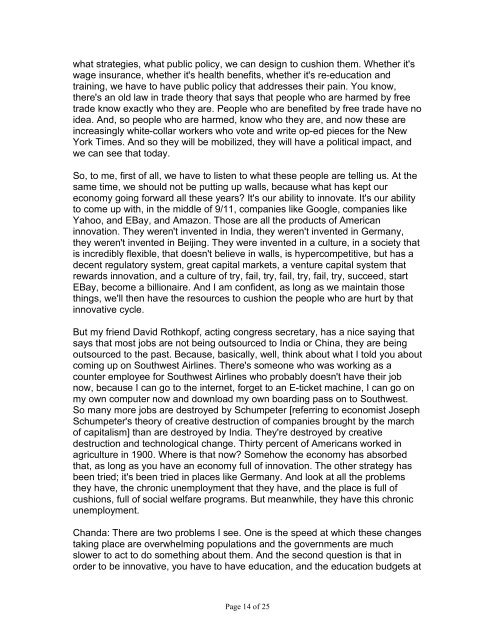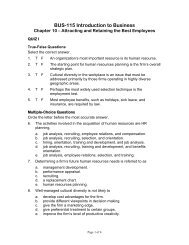Why the World Is Flat
Why the World Is Flat
Why the World Is Flat
You also want an ePaper? Increase the reach of your titles
YUMPU automatically turns print PDFs into web optimized ePapers that Google loves.
what strategies, what public policy, we can design to cushion <strong>the</strong>m. Whe<strong>the</strong>r it's<br />
wage insurance, whe<strong>the</strong>r it's health benefits, whe<strong>the</strong>r it's re-education and<br />
training, we have to have public policy that addresses <strong>the</strong>ir pain. You know,<br />
<strong>the</strong>re's an old law in trade <strong>the</strong>ory that says that people who are harmed by free<br />
trade know exactly who <strong>the</strong>y are. People who are benefited by free trade have no<br />
idea. And, so people who are harmed, know who <strong>the</strong>y are, and now <strong>the</strong>se are<br />
increasingly white-collar workers who vote and write op-ed pieces for <strong>the</strong> New<br />
York Times. And so <strong>the</strong>y will be mobilized, <strong>the</strong>y will have a political impact, and<br />
we can see that today.<br />
So, to me, first of all, we have to listen to what <strong>the</strong>se people are telling us. At <strong>the</strong><br />
same time, we should not be putting up walls, because what has kept our<br />
economy going forward all <strong>the</strong>se years? It's our ability to innovate. It's our ability<br />
to come up with, in <strong>the</strong> middle of 9/11, companies like Google, companies like<br />
Yahoo, and EBay, and Amazon. Those are all <strong>the</strong> products of American<br />
innovation. They weren't invented in India, <strong>the</strong>y weren't invented in Germany,<br />
<strong>the</strong>y weren't invented in Beijing. They were invented in a culture, in a society that<br />
is incredibly flexible, that doesn't believe in walls, is hypercompetitive, but has a<br />
decent regulatory system, great capital markets, a venture capital system that<br />
rewards innovation, and a culture of try, fail, try, fail, try, fail, try, succeed, start<br />
EBay, become a billionaire. And I am confident, as long as we maintain those<br />
things, we'll <strong>the</strong>n have <strong>the</strong> resources to cushion <strong>the</strong> people who are hurt by that<br />
innovative cycle.<br />
But my friend David Rothkopf, acting congress secretary, has a nice saying that<br />
says that most jobs are not being outsourced to India or China, <strong>the</strong>y are being<br />
outsourced to <strong>the</strong> past. Because, basically, well, think about what I told you about<br />
coming up on Southwest Airlines. There's someone who was working as a<br />
counter employee for Southwest Airlines who probably doesn't have <strong>the</strong>ir job<br />
now, because I can go to <strong>the</strong> internet, forget to an E-ticket machine, I can go on<br />
my own computer now and download my own boarding pass on to Southwest.<br />
So many more jobs are destroyed by Schumpeter [referring to economist Joseph<br />
Schumpeter's <strong>the</strong>ory of creative destruction of companies brought by <strong>the</strong> march<br />
of capitalism] than are destroyed by India. They're destroyed by creative<br />
destruction and technological change. Thirty percent of Americans worked in<br />
agriculture in 1900. Where is that now? Somehow <strong>the</strong> economy has absorbed<br />
that, as long as you have an economy full of innovation. The o<strong>the</strong>r strategy has<br />
been tried; it's been tried in places like Germany. And look at all <strong>the</strong> problems<br />
<strong>the</strong>y have, <strong>the</strong> chronic unemployment that <strong>the</strong>y have, and <strong>the</strong> place is full of<br />
cushions, full of social welfare programs. But meanwhile, <strong>the</strong>y have this chronic<br />
unemployment.<br />
Chanda: There are two problems I see. One is <strong>the</strong> speed at which <strong>the</strong>se changes<br />
taking place are overwhelming populations and <strong>the</strong> governments are much<br />
slower to act to do something about <strong>the</strong>m. And <strong>the</strong> second question is that in<br />
order to be innovative, you have to have education, and <strong>the</strong> education budgets at<br />
Page 14 of 25









